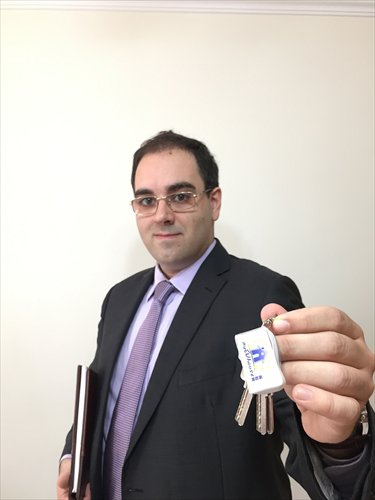Expat real estate agents share their secrets about selling overseas properties to Chinese buyers

As Chinese money flows into overseas property markets, more and more expat realtors like Stelios Miliarakis are finding a place in China. Photo: Courtesy of Stelios Miliarakis
The Greek housing market may be in the gutter, according to recent reports, but you wouldn't know it from the booming business that realtor Stelios Miliarakis has been seeing. That's because Miliarakis caters to a very specific segment of buyers: prosperous Chinese with an eye toward acquiring foreign properties.
"They are so interested. They tend to expect you to know everything about everything," said Miliarakis, who peddles his properties at real estate exhibitions in Beijing, where he lives. He even has clients who ask questions like the latitude and longitude of the property, or how much a kilogram of potato costs in Greece.
Miliarakis, who previously worked in the hospitality sector, decided last year to switch over to selling real estate to Chinese buyers, because he has great confidence in the market.
According to a report this month by the Rosen Consulting Group and the Asia Society, Chinese investment in American properties has surpassed $300 billion and is still growing, Reuters reported. In 2015, Chinese surpassed Canadians as the No. 1 buyers of houses in America for the first time. China also spent more money than any other country on American homes between 2013 and 2015, the report said.
According to the agents interviewed by Metropolitan, there are a range of reasons why Chinese are taking a growing interest in buying properties overseas.
For one thing, many countries offer cheaper houses than you'd be able to find in first-tier cities in China, where apartments can run into the millions of dollars. Owning property overseas can also help families interested in immigrating, either for work or educational opportunities, or in an effort to escape China's pollution. Still others are simply interested in investing in properties.
With more money pouring into the overseas real estate market, China is seeing a growing number of foreign realtors catering specifically to wealthy Chinese buyers.

Being a foreigner can be an advantage when it comes to selling overseas properties to Chinese buyers. Photo: IC
Courting Chinese buyers
One thing Miliarakis has noticed about Chinese clients is that most rely excessively on their agents, rather than doing research on their own.
That means that foreign agents must learn to provide as much information as possible.
Yet it isn't enough for them to simply speak Chinese, Miliarakis says. Rather, they need to find different ways of engaging with clients, which is why more expat agents are working to master the art of social media, since platforms such as WeChat, Sina Weibo and QQ are greatly popular among younger Chinese.
"Social media is super important for real estate consultants, especially in China," he said. "Who would send or read an e-mail when you can just read a WeChat message or write a WeChat blog that people can read on their way to work in the morning?"
Miliarakis runs a public WeChat account, where he not only posts information about houses on sale, but also shares posts about the lifestyle in Greece. "Although many are still just interested in the investment part, others really care about the life they are going to have there."
Alex Edmunds, an American agent who works and travels between Beijing and Los Angeles for Mandeville Capital, a California real estate consultancy with offices in Beijing, said that one of the biggest differences between China and the US is that in the latter, buyers and sellers typically work with just one agent, while in China, both buyers and sellers use multiple agents, which can cause agents to be less devoted.
"Chinese needs are very different," he said. "For example, they don't need to be in the center of the city."
According to Edmunds, Chinese buyers who choose overseas property for living purposes usually want their homes to be in a good school district, and they especially like houses with yards.
"For many Chinese people, to realize the 'American dream,' having a yard is much more important than living in the city center."

Alex Edmunds is a bilingual American real estate agent based in Beijing and Los Angeles who mostly caters to Chinese families who hope to send their children to university in the US. Photo: Courtesy of Alex Edmunds
The changing market
Compared to other countries, the US has obvious advantages and disadvantages that might affect a buyer's decision to invest. For example, Edmunds finds many families turning to Australia because there's less of a time difference with China, meaning it's more convenient to talk with family back home.
Still, the US has other advantages, Edmunds said.
"America has a very strong legal system, so people appreciate that their assets are safe. And the education is the best."
Edmunds mostly sells to business owners or managers of companies in their 30s and 40s, who are hoping to send their children to American universities.
"Sending children to college is definitely the main factor," he said.
While properties in cities like Los Angeles and New York are as popular as ever, other locations like Texas are becoming increasingly popular with Chinese buyers due to their good cost performance, said Edmunds.
Another trend that Edmunds has noticed is growing interest in investment purchases as compared with residential purchases, which he thinks is due to the volatility of the stock market last year, which has led to interest in safer investments.
Miliarakis' target clients are also Chinese people in their late 30s or 40s who have primary school-aged children. That's because this is around the time when wealthy Chinese parents typically start thinking about whether to send their children to middle school abroad or let them wait until college.
Based on Miliarakis' experience, Chinese interest in the European market has been shifting recently. While Portugal once drew the highest number of buyers, it is now being overtaken by Spain. Greece has also been seeing a surge in buyers, as doubts related to the country's debt and refugee crises begin to fade.
In short, the bigger picture - including the state of a country's economy, immigration policies and political status - can all have a major impact on whether or not clients decide to purchase.
Miliarakis recalled that his very first client was going to buy a property in Greece, but dropped the deal in the end after the news about the country's economic crisis broke.
Expat agents' advantage
In this competitive market, where millions of dollars are at stake, does it help or hurt to be a foreigner?
In Edmunds' case, it's proven a major advantage. According to him, the majority of realtors who work with Chinese buyers are Chinese themselves, most of whom immigrated to the US starting in the 1980s.
"Basically every time a client comes in, they ask about schooling. And I was born and raised here in Los Angeles, and I went to school and college here," he said.
"A lot of times when they are in LA, they will come over to my home to see what a local American family is like, and I think they really appreciate that," he added.
A good understanding of Chinese culture is also very important for expat realtors.
"As a laowai, you will have to know something about feng shui. You can tell them stuff like, 'This house is nice, facing south, with water in the front and mountains in the back.'"
Javier Bahut Vega, director of the Shanghai office of Gold Millenium Group (GMG), agrees that it's crucial that companies staff agents who understand the needs of Chinese customers - which is why GMG has made a point of hiring Chinese employees. Ten years ago, when GMG was first built, it was a consultation company helping Spanish clients develop their businesses in China. In 2013, though, seeing the potential in overseas property purchasing, the company shifted part of its focus to real estate.
According to Vega, although being a Spanish company selling Spanish real estate is a big advantage, Chinese buyers also want the help of Chinese agents.
"The value of our Chinese colleagues is more in Spain than in China. When buyers visit, they want Chinese people there to show them around," he said.
Therefore, a combination of Chinese and foreign employees has become a common practice for many real estate agencies in China, and has been proven a successful strategy for building trust.
The key to success
Part of what GMG is trying to do, Vega said, is not only sell properties in Spain, but sell the country itself.
"Because of the economic crisis in 2008, property prices in Spain went down greatly, and now as the economy revives, the real estate prices haven't fully recovered, which makes it an opportunity to invest."
"The Chinese are very smart and ask so many questions. For us, it's very interesting because every day is a learning process," Vega said.
"They ask about the hospitals, schools in the area, and they are worrying about if they can keep the property for life."
Vega's trick is to highlight the perks of buying in Spain, such as the fact that property there is cheaper than in other Western countries, it ranks high internationally in terms of healthcare, the fact that most schools are bilingual, and that international schools are much cheaper compared with in Beijing.
"For example, being able to speak English is not amazing anymore, so it'll open a lot of doors for their children in the future if they can speak Spanish as well."
While Miliarakis devotes a lot of his efforts to social media marketing, Edmunds attaches more importance to making phone calls. Vega, meanwhile, does business the old-fashioned way, traveling from city to city in China to meet with clients and partners.
According to Edmunds, though, the most important factor for success is building trust. "In the past, there've been tricks in the business and poor communication. You need to build trust, and make them feel they want to make a lifetime purchase with you," he said.
"We are not in the business of selling real estate, but rather trust," Vega said.
Newspaper headline: Closing the deal